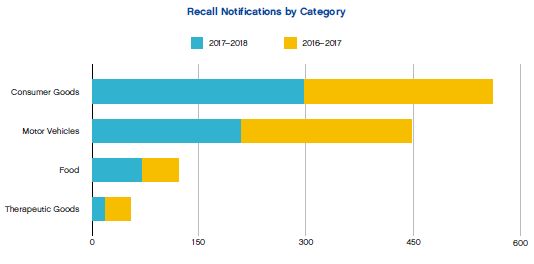- within Strategy and Accounting and Audit topic(s)
Product recalls are becoming increasingly common. The Australian Competition and Consumer Commission ("ACCC") and industry-specific regulators are very active in both overseeing product recalls and prosecuting non-compliance with legislative requirements. The ACCC is inclined to target large corporations. A failure to adhere to legislative requirements may be an offence and / or be met with a civil penalty enforced by the ACCC. Since 1 September 2018, penalties for non-compliance have substantially increased. Individuals may be subject to disqualification orders for participation in certain breaches.
Suppliers must comply not only with legislative obligations but the informal requirements of the ACCC in conducting a recall. These include collaborating with the ACCC to develop a recall strategy, providing regular progress reports to the ACCC during a recall and complying with the ACCC's recall closure procedures. Product recalls can span for years and be highly onerous and expensive.
The product recall regime is complemented by a legislative product-safety framework that concerns product bans, safety warnings and compulsory reporting of serious safety-related incidents caused by consumer products.
BACKGROUND
Given strong consumer protection laws and tight regulation, being adequately prepared to carry out a successful product recall is fundamentally important to any enterprise engaged in the manufacturing or distribution of goods in Australia. In March 2017, Consumer Affairs Australia and New Zealand ("CAANZ") completed a review of the Australian Consumer Law ("ACL") identifying for Ministers' consideration a package of reforms in pursuit of best-practice consumer law and policy.1 In respect of product safety, CAANZ recommended greatly increasing fines and penalties proportionate to other ACL penalties; for example, CAANZ recommended increasing penalties for the failure or refusal to notify a voluntary recall. With effect from 1 September 2018, the Treasury Laws Amendment (2018 Measures No. 3) Act 2018 amended the ACL to strengthen the penalties regime in line with the CAANZ recommendations in relation to false or misleading representations, unconscionable conduct, non-compliance with safety and information provisions and other unfair practices.
Suppliers are responsible for the provision of safe consumer products in Australia and the assessment and (if necessary) rectification of any safety concerns presented by goods that they supply. Suppliers include manufacturers as well as importers, distributers and retailers. Where goods have been distributed and a safety concern is subsequently detected, suppliers may be required to conduct a product recall.
Product recalls in Australia are primarily regulated through the ACL in circumstances where the recall is motivated by safety concerns. If a supplier wishes to recall goods for any other reason, they do so absent the regulation imposed by the ACL.2
As at the time of writing, there are 9,991 active recalls with motor-vehicle related recalls (e.g., cars, motor bikes, quad-bikes, boats, trailers) representing more than 40 percent of the total active product recalls.3 The chart below represents the breakdown by product type of active recalls.
In the 2017–18 financial year, the ACCC published a total of 591 recall notifications.4 In the 2016–17 financial year, there were 592 recall notifications.5 The chart below shows the number of recall notifications for those financial years broken down by category.

For the 2015–16 financial year, there were 670 recalls, which was a significant increase from 596 recorded in the 2014–15 financial year.6 These figures are part of an upwards trend in recent years of product recalls with motor vehicles, followed by food and groceries being the most frequent product type to be subject to a recall.

In a study of product recalls in Australia between 1987 and 2010, a period where there were over 10,000 product recalls,7 the average rate at which products were returned by consumers was 57 percent, but rates varied considerably depending on the type of product. The rate for recalls on motor vehicles and therapeutic goods in the period was found to be very high, at 80 percent and 72 percent respectively, whereas the rate for general consumer goods was only 39 percent.8
In 2016, the ACCC conducted a study to determine factors of recall success.9 The study found that price point, availability of a customer contact list, lifespan of a product and consumer perception of the risk and hazard of the product were factors that most influenced the return of recalled products. The first eight weeks following notification were the most important, with 80 percent of all products likely to be returned being returned within that time. It was also found that 70 percent of consumers were likely to return a product that cost $25 or more.
This provides insight on the onerousness of recalls generally: goods of greater monetary value or necessity have a higher return rate (and place a greater burden on suppliers) than consumer perishables where consumers are more likely to dispose of the product themselves and wear the cost. In either case, a supplier's exposure to liability can be significant.
An effective recall strategy is vital to ensure a high return rate and to minimise potential liability from the distribution of faulty consumer goods. This guide will provide general guidance to navigate the regulatory requirements to initiate and successfully carry out a product recall.
Footnotes
1. See Australian Consumer Law Review, Final Report, March 2017.
2. ACL ss 122–128.
3. See Product Safety Australia (ACCC) website.
4. ACCC and the Australian Energy Regulator ("AER"), Annual Report 2017-18, October 2018.
5. ACCC and AER, Annual Report 2016-17, August 2017.
6. ACCC "Check your home for recalled products", 2 August 2016.
7. ACCC "Review of the Australian product safety recalls system" (2010) 1.
8. ACCC (2010) at 18.
The content of this article is intended to provide a general guide to the subject matter. Specialist advice should be sought about your specific circumstances.
[View Source]




